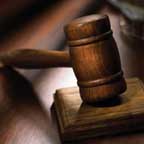What's in a Name: Schools, Lawyers, & Indian Chiefs

So, what’s wrong with the Braves? Nothing. What a great end to the Bradley Braves’ year. The men’s team earned a spot in the Sweet 16 of the NCAA basketball tournament.
Okay then, what’s wrong with the name “Braves”? Some people say there’s nothing wrong with the name “Braves” or the name “Illini” at the University of Illinois. However, the National Collegiate Athletic Association (NCAA) believes otherwise.
The NCAA is a voluntary organization of the nation’s colleges and universities. The association governs their members’ athletics programs and conducts 88 championships in 23 sports in which more than 40,600 student-athletes compete annually. Both Bradley University and the University of Illinois are members of the NCAA.
Member institutions are subject to the rules and bylaws of the NCAA. In 2003, the NCAA Executive Committee passed several recommendations submitted by its Subcommittee on Gender and Diversity Issues on the use of American Indian mascots, nicknames, and logos. One of the recommendations required member institutions (schools) to determine whether the depiction of the mascot, nickname, or logo could be viewed as offensive. Of those schools, 19 of the self-studies didn’t satisfy the NCAA’s concerns that some people could consider the use of the mascot or imagery as “hostile or abusive.” Two of these 19 included Bradley and Illinois.
Five other NCAA schools—Alcorn State University, Chowan College, Husson College, the University of West Georgia, and the University of North Carolina at Pembroke—also use the name “Braves.” UNC-Pembroke was able to justify its use of the nickname “Braves” because it was founded as a school for Native Americans and its enrollment was 21 percent Native American. Because the school demonstrated its name was a direct result of Native Americans attending or associating with the school, it’s allowed to keep the name.
Florida State University was removed from the list of restricted schools because FSU was able to evidence a “unique relationship between the university and the Seminole Tribe of Florida.” Because the tribe approved of how its name and imagery was used by Florida State, they continue to use the nickname “Seminoles” and their mascot, Chief Osceola. Similarly, the University of Utah remains the “Utes,” Central Michigan University remains the “Chippewas,” and Mississippi College remains the “Choctaws” with the approval of those respective tribes.
Ironically, the Peoria Tribe of Indians of Oklahoma are descendants of the group of tribes known as Illiniwek, or Illini, and that tribe has asked the University of Illinois to stop using Chief Illiniwek as the school mascot.
Several schools have changed their names voluntarily. For example, the Southeast Missouri State Indians are now the Redhawks, Stonehill College replaced Chieftains with Skyhawks, and Southeastern Oklahoma State changed from the Savages to the Savage Storm.
What happens if the NCAA doesn’t approve of or exempt the nickname? The NCAA decided schools with unapproved names wouldn’t be able to display their logos, mascots, or nicknames while participating in any of the 88 championships, won’t be able to host championship competitions, and related merchandise wouldn’t be sold at the championship site. While the affected schools still can participate, the names or logos would have to be covered. Alternatively, the schools could remove themselves from the NCAA by leaving the association, but that isn’t a practical solution. In 2004-2005 alone, the NCAA distributed more than $298 million to its members.
The issue doesn’t violate freedom of speech. The First Amendment prohibits Congress and the States (through the Fourteenth Amendment) from “abridging the freedom of speech,” but those units of government aren’t acting here. Instead, the NCAA is acting, and as a private organization, it can limit or restrict the speech or expression of its members.
Even with all the state schools that belong to it, the NCAA isn’t a governmental body, and the United States Supreme Court concurs. In 1977, the NCAA placed the University of Las Vegas (UNLV) on probation because of violations of NCAA rules by its men’s basketball coach, Jerry Tarkanian. The NCAA also told UNLV that more sanctions were possible if the school didn’t show cause for keeping Tarkanian as head coach. Facing demotion and a significant loss in pay, Tarkanian sued the NCAA, alleging it was acting like the state government and using a state entity, the university, to deprive him of his right to earn a living. The case went all the way up to the Supreme Court, and the court held that the NCAA wasn’t wielding state powers. Instead, it would be the university—not the NCAA—that deprived him of his salary, and therefore the NCAA wasn’t liable for any losses he would incur.
As a result, the NCAA can use its influence and powers to persuade and compel its member institutions to do certain things. Even to change a name. IBI

